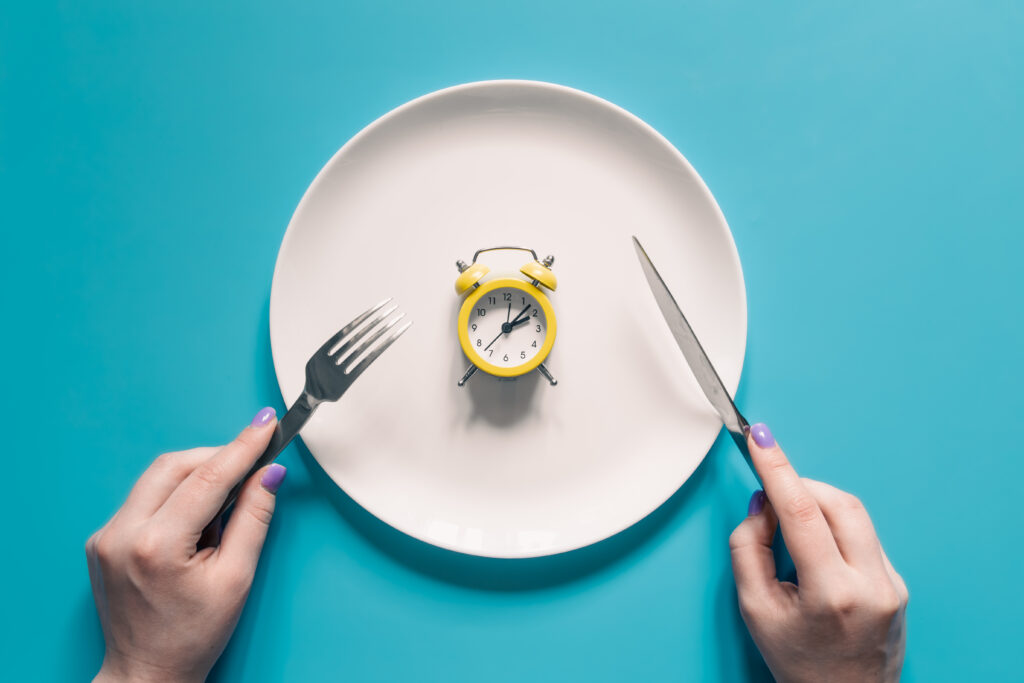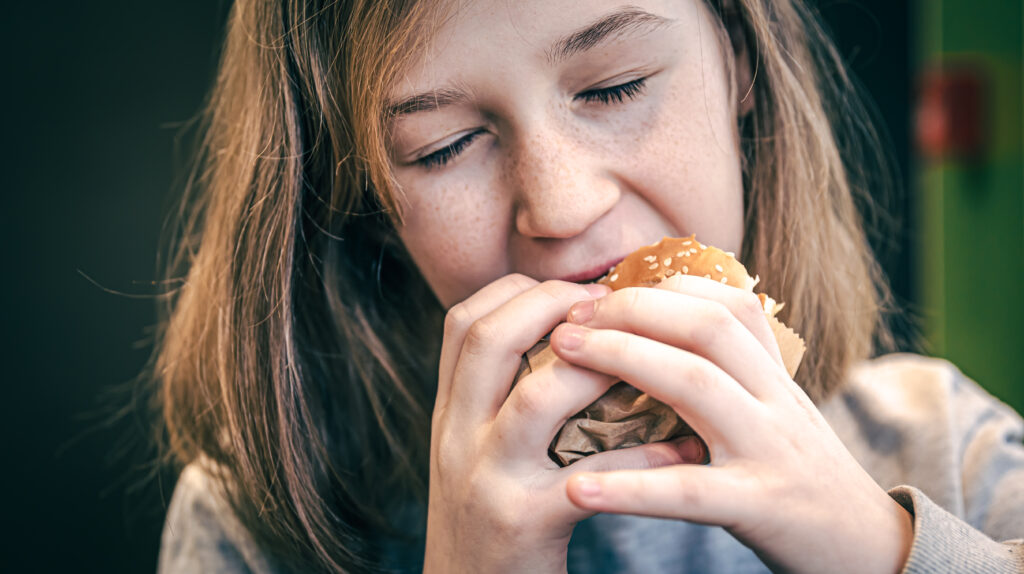Unlike traditional diets that focus on what you consume, intermittent fasting emphasizes when you eat. During the fasting periods, the body does not consume any calories, which leads it to utilize energy reserves, including stored fat. However, it's significant to focus on the nutritional quality of your meals. The diet should be customized to meet your body's needs and provide all essential nutrients.
Intermittent fasting isn’t about starving oneself – it focuses on cutting down calories for short periods. The idea is that your organism becomes satisfied with smaller amounts while decreasing cravings for unhealthy products. That is, as long as you keep a healthy diet while trying it out.

It involves setting a time frame during the day in which we fast. The established pattern must be repeated every day. We should only eat in a short time – if we don’t make it, the meal is lost.
The most popular type of TRF fast is the 16:8 rule. In this time-restricted form, you have set intermittent fasting periods and detailed windows where you can consume. For example, you fast for 16 hours daily and can eat for only eight hours of the day.
Again, discovering the proper eating and fasting windows for this technique can take some trial and error, particularly if we are busy, active, or wake up hungry.
The 5:2 method focuses on cutting your calories to 500 for two days a week. You maintain a healthy and steady diet during the other five days of the week.
This strategy usually has a 200-calorie meal and a 300-calorie meal on fasting days. Concentrating on high-fiber and high-protein products to aid in filling you up and keep calories low when fasting is essential.
You can select your two fasting days if there is a non-fasting day between them. Ensure to consume the same amount of food you usually would on non-fasting days.
There are no strict recommendations regarding the choice of individual food products and their quantities on days you can eat or during the so-called metabolic window.
Despite this, it is worth following a balanced diet, and when choosing food products, you should be guided by the principles in the healthy eating plate. It is worth including in your diet: vegetables and fruits, whole grain products, legumes, lean meat, fish, seafood, vegetable oils, dairy products, nuts, seeds and seeds.
In a healthy diet, you should significantly limit fast food, sweet and salty snacks, fatty dairy products and meat, and sweet drinks.
People who use intermittent fasting claim that it has an excellent effect on the process of weight loss.
The intermittent fasting diet is most often used by people who:
Preparation should always begin with a consultation with a doctor or dietitian with appropriate education and experience. Analyzing previous eating habits and adjusting the nutrition model is necessary. Laboratory tests should also be performed to assess the general state of health.
Before starting intermittent fasting, it is worth considering the following tests:
These tests allow you to assess your general health and are also the basis for monitoring the effects of intermittent fasting. It should be remembered that the tests themselves do not provide 100% certainty that intermittent fasting will be safe in a given case.
The health benefits and effects of intermittent fasting are the subject of research. The studies conducted so far demonstrate that this model of nutrition can, among other things:
The number of high-quality studies examining the benefits of intermittent fasting (IF) is still limited. It remains unclear whether the positive effects observed are due to intermittent fasting or a reduction in overall energy intake and a shift toward healthier eating habits. Furthermore, additional research is needed to understand the long-term impacts of this dietary approach.
Some individuals may counteract fasting periods by overeating during their eating windows, which can result in weight gain rather than weight loss. It's also important to recognize that fasting can pose risks, such as halitosis, stomach ulcers, digestive and absorption disorders, and deficiencies in vitamins and minerals.
Intermittent fasting is not appropriate for everyone. Contraindications to this nutritional model include:
People with chronic diseases should consult a doctor before starting an intermittent diet. Athletes should also be careful because periodic fasting can make it difficult to prepare for training and sports competitions properly and can cause weakening of the body.
It is also worth bearing in mind that in the case of undiagnosed diseases, the side effects may be much more serious than the benefits of intermittent fasting. A diet not adapted to the state of health may induce diseases that are currently incurable, and their effects remain for the rest of life.
Food is often used as a method to bring comfort or reward. Sometimes, it is also linked with childhood and a period of carefree pampering. Unfortunately, “eating” emotions that we cannot manage only bring momentary satisfaction and is often associated with an even greater sense of guilt. In those situations, creating a healthy relationship with food and understanding or getting proper help in dealing with emotions is essential. Nevertheless, the most crucial thing is to know how emotional hunger varies from standard physiological hunger. This will make it much more manageable for us to control compulsive behaviors.

Hunger is often signaled by muscle spasms in the stomach walls, a feeling of weakness, headaches, or issues with concentration. In the case of physiological hunger, these symptoms intensify gradually as the energy deficit increases. Nevertheless, this hunger is unrelated to characteristic products, and its satisfaction can be postponed. The feeling of satiety is felt 10-15 minutes after consuming a meal. It is usually accompanied by a feeling of satisfaction and peace, as well as a sense of having satisfied the energy deficiency. In this situation, it is unlikely to feel guilty, particularly if we follow a balanced diet.
Unfortunately, unlike the physiological signs, emotional hunger occurs suddenly and is often focused on a specific kind of food. Another distinguishing quality of this type of hunger is an intense and irresistible desire that must be fulfilled as soon as possible.
Compulsive overeating is also associated with a certain lack of control. The previously mentioned desire is a drive to eat that is independent of physiology. Therefore, when we feel emotional hunger, we eat more food, despite feeling full, because our purpose is to fulfill the desire. Very often, these attacks end with a feeling of guilt, as well as restrictive diets.
Stress can be a cause of overeating. Eating then becomes a way of coping with problems, a means of distracting attention from unpleasant stimuli and avoiding threats. The availability of food means that for many people eating becomes a strategy for coping with stress, and can even be used to “swallow emotions”.
The relationship between emotions and eating is two-sided – food can increase the intensity of certain emotions, but mood also determines the way of eating.
In the practice of a dietitian, it is increasingly important to thoroughly understand eating behaviors, including the assessment of hunger – satiety, thoughts and emotions, as well as physical activity. A tool for learning self-observation is a journal used in the cognitive-behavioral approach. Keeping a journal helps:
Intermittent fasting has some disadvantages:
Side effects during intermittent fasting occur in most cases within the first two weeks when the body has to adapt to the new rules of functioning.
The most typical side effects of fasting include:
It is these inconveniences that may be the reason for giving up on the principles of fasting. Although the side effects mentioned usually disappear after about 2-4 weeks, this temporary state may be unbearable for some people.
Although there is not much hard data on this, there are indications that in some people, IF has the potential to worsen their relationship with food or even develop eating disorders.
Restrictions and limitations can lead to negative psychological effects (this also applies to weight loss diets with a constant calorie deficit, as well as elimination diets). So, we can assume that restrictions in the intermittent fasting system can also cause this effect. However, there is currently no evidence to advise against intermittent fasting for this reason.
In practice, if you feel that you may be exposed to these negative consequences (because you tend to react negatively to imposed restrictions), consider this when deciding whether IF is the right nutrition model for you. And if you decide to do it – watch your reactions, be vigilant.
Of course, intermittent fasting can be properly balanced and nutritious, and that is what we encourage. However, limiting the time of eating meals in a specific eating window may also result in a certain permission to often reach for poorer quality food. This may be accompanied by the belief that since you are on IF, you can eat anything and lose weight or at least not gain weight. Unfortunately, this is not so obvious.
In addition, if you switch to eating in the eating window model and try to eat 2 or 3 meals, and previously you had more, it is also possible that you may inadvertently find yourself in a deficit or in a larger deficit than you expected. And too much calorie restriction when losing weight is not a good idea when it comes to effective reduction and long-term maintenance of its effects.
All these aspects can affect the deterioration of the quality of your diet and a greater risk of nutritional deficiencies. Relying on highly processed food, lack of valuable sources of macro- and micronutrients, and the risk of a low-calorie diet are not things that are conducive to a healthier lifestyle.

Larger portions of food at once than you are used to can cause digestive problems. The reaction depends on the sensitivity of your digestive system and on what portions you ate before. For example, people with SIBO may observe an exacerbation of symptoms just from increasing the portion (even if they do not introduce the ‘forbidden' products).
Fewer meals mean poorer protein distribution during the day, which is especially important if you train. This doesn't mean that training won't have an effect, but a regular protein intake is important for building muscle and maintaining it during the weight loss process.
You may also encounter difficulties in your social life. Keep in mind that you will either have to bend your rules on these days or adjust your eating behavior accordingly when meeting with loved ones.
In addition to the so-called hourly energy deficit, it is worth mentioning that many women who decide to do IF do so as part of a fat loss plan. Unfortunately, IF for people who already have a deficit and low energy availability (active women) can be disastrous in the long run. Menstrual disorders, hormonal imbalances, and deterioration of bone mineralization are a vicious circle that characterizes the triad of female athletes.
The same applies to women who suffer from thyroid disorders, which are also associated with low energy availability. It is really not worth playing around with such solutions if the reduction does not take place as planned for a long time.
Fasting, e.g. 24 hours, increases water retention in the body, especially if a low-carb diet is used on a daily basis. I warn against this and appeal to pay attention to the organism's reaction.
Remembering fasting is not indifferent to the hormonal system is important.
Women, as more sensitive beings, may definitely feel this more through irritation, greater weakness, and, of course, menstrual cycle disorders—no calories – no reproduction. IF also affects the increase in cortisol levels, so if you suffer from chronic stress, overwork yourself with training, and do not have time to rest, not to mention adrenal fatigue. IF it may not be for you, give it a miss. Some studies also show a decrease in glucose tolerance in the case of women using IF.
Combining this with chronically high cortisol levels in the above cases will not promote fat loss. The effect may be the opposite (the effect of fasting on cortisol levels is ambiguous – some studies talk about its increase and decrease after a one-day fast).
Table of Contents